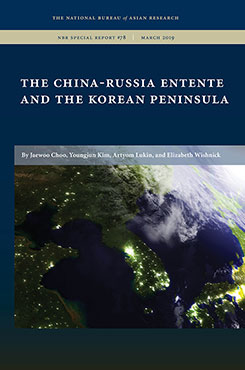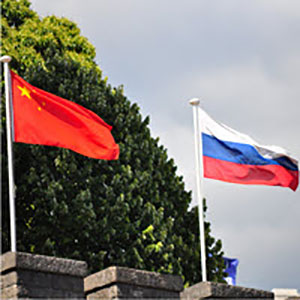Russia’s Game on the Korean Peninsula
Accepting China’s Rise to Regional Hegemony?
This essay examines Sino-Russian interactions regarding North Korea and considers the implications for Russia’s wider policy toward East Asia.
EXECUTIVE SUMMARY
MAIN ARGUMENT
Russia’s behavior toward the Korean Peninsula is determined by a complex mix of motives and interests that include a commitment to nonproliferation, desire to avert war on the Russian Far Eastern border, pursuit of economic benefits, and consideration of great-power prestige. Moscow’s quasi-alliance with Beijing is another factor in Russian policies toward North Korea, and an increasingly salient one. The Kremlin is aware that North Korea is vital for China’s security and recognizes that Beijing’s stakes in the Korean Peninsula are significantly higher than Moscow’s. In return for its cooperation, Moscow expects Beijing’s acknowledgment of Russian interests in areas of paramount concern, such as the Middle East and Eastern Europe. The last year saw the emergence, and even institutionalization of sorts, of a Beijing-Moscow-Pyongyang alignment. This recalls the 1950s when the three were Communist allies against the U.S.—only this time it is Beijing, rather than Moscow, that is the leader in the trio. Russia’s willingness to play second fiddle to China on the Korean Peninsula should be placed in the wider East Asian context. This disinclination to balance China’s rising influence in East Asia is primarily due to the fact that most of the region lies outside the area of Russia’s vital national interests. Chinese expansionism in East Asia and the Pacific benefits Russia because it diverts U.S. attention and resources from confrontation with Moscow in Europe.POLICY IMPLICATIONS
- Close collaboration between Beijing and Moscow on North Korea could pose serious problems for Washington. It is likely that after the failed Hanoi summit Pyongyang will seek, and receive, support from China and Russia, thus making it less inclined to accept the denuclearization demands from the U.S.
Sino-Russian cooperation on the Korean Peninsula may be an indication of more things to come. In the coming years, the U.S. may have to confront a China-Russia united front, or at least their tacit coordination, on other security issues in the Indo-Pacific. - At some point, Washington may be forced to seek Moscow’s collaboration in managing the challenge from Beijing. The Kremlin is unlikely to participate in any containment of China, but it might agree to distance itself from Beijing’s agenda in East Asia and become a neutral player. However, Washington will have to first normalize relations with Moscow.
Artyom Lukin is an Associate Professor in the Department of International Relations and Deputy Director for Research in the School of Regional and International Studies at Far Eastern Federal University in Vladivostok, Russia.



